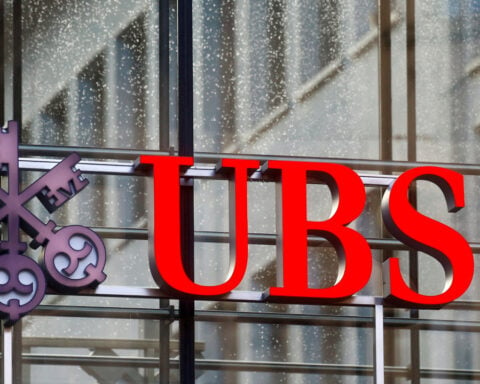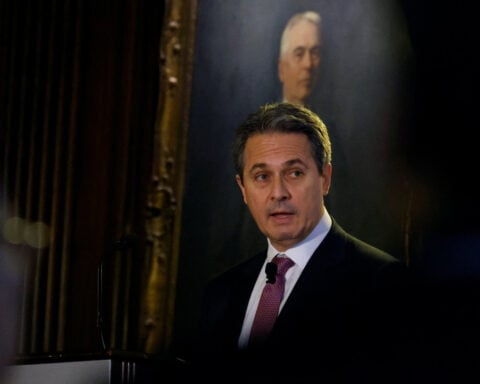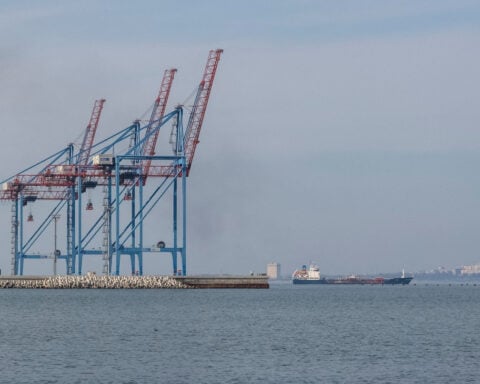By Arathy Somasekhar
HOUSTON (Reuters) -Oil prices rose about 1% on Friday, but fell for the week on worries that strong U.S. economic data would keep interest rates elevated for a longer period, curbing fuel demand.
The Brent crude July contract rose 76 cents to $82.12 a barrel. The more-active August contract closed up 73 cents at $81.84.
U.S. West Texas Intermediate (WTI) crude futures settled 85 cents, or 1.1%, higher to $77.72.
On Thursday, Brent closed at its weakest since Feb. 7 and U.S. WTI futures at their lowest since Feb. 23.
Summer demand in the United States is expected to pick up starting this weekend, and some investors are wondering if the selloff was exaggerated, said Dennis Kissler, senior vice president of trading at BOK Financial.
Brent closed down 2.1% for the week. It declined for four straight sessions this week, its longest losing streak since Jan 2. WTI settled down 2.8% for the week.
Worries over Federal Reserve interest rate policy and last week's bump in US crude oil inventories weighed on market sentiment, said Tim Evans, an independent energy analyst.
Minutes of the Fed's latest policy meeting released on Wednesday showed policymakers questioning whether interest rates were high enough to tame stubborn inflation. Some officials were willing to raise borrowing costs again if inflation surged.
Fed Chair Jerome Powell and other policymakers have since said they feel further increases are unlikely.
Higher interest rates increase the cost of borrowing, which can slow economic activity and dampen demand for oil.
Consumer sentiment also fell to a five-month low on mounting fears about borrowing costs staying high. At face value, pessimism among households would imply slower consumer spending, though the relationship between the two has been weak.
Oil demand is still robust from a broader perspective, analysts at Morgan Stanley wrote in a note, adding they expect total oil liquids consumption to increase by about 1.5 million barrels per day this year.
Soft U.S. gasoline demand has been offset by global demand, which surprised to the upside, especially in the early parts of the year, the analysts said.
U.S. gasoline product supplied, a proxy for demand, reached its highest level since November in the week to May 17, the Energy Information Administration (EIA) said on Wednesday.
On the supply side, the oil rig count, an early indicator of future output, was unchanged at 497 this week, energy services firm Baker Hughes said.
Meanwhile, the market is awaiting a June 2 online meeting of the OPEC+ producer group comprising the Organization of the Petroleum Exporting Countries and its allies to discuss whether to extend voluntary oil output cuts of 2.2 million barrels per day.
Analysts largely anticipate that current production cuts will be extended at least to the end of September.
Russia, in a rare admission of oil overproduction, said this week it exceeded its OPEC+ production quota in April for "technical reasons," a surprise that analysts and industry sources say shows Moscow's challenges in curbing output.
Venezuela aims to produce 1.23 million barrels per day (bpd) of oil in December, adding about 290,000 bpd compared to the start of the year, following the addition of drilling rigs, oil minister Pedro Tellechea said.
Money managers raised their net long U.S. crude futures and options positions in the week to May 21, the U.S. Commodity Futures Trading Commission (CFTC) said on Friday.
(Reporting by Arathy Somasekhar in Houston, Robert Harvey and Natalie Grover in London, Georgina McCartney in Houston and Jeslyn Lerh in Singapore; Editing by David Goodman, Richard Chang, Sharon Singleton and Deepa Babington)

 Trump has begun another trade war. Here's a timeline of how we got here
Trump has begun another trade war. Here's a timeline of how we got here
 Canada's leader laments lost friendship with US in town that sheltered stranded Americans after 9/11
Canada's leader laments lost friendship with US in town that sheltered stranded Americans after 9/11
 Chinese EV giant BYD's fourth-quarter profit leaps 73%
Chinese EV giant BYD's fourth-quarter profit leaps 73%
 You're an American in another land? Prepare to talk about the why and how of Trump 2.0
You're an American in another land? Prepare to talk about the why and how of Trump 2.0
 Chalk talk: Star power, top teams and No. 5 seeds headline the women's March Madness Sweet 16
Chalk talk: Star power, top teams and No. 5 seeds headline the women's March Madness Sweet 16
 Purdue returns to Sweet 16 with 76-62 win over McNeese in March Madness
Purdue returns to Sweet 16 with 76-62 win over McNeese in March Madness








